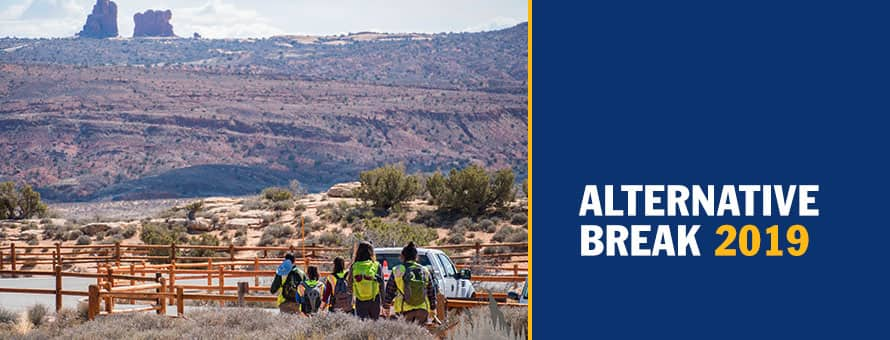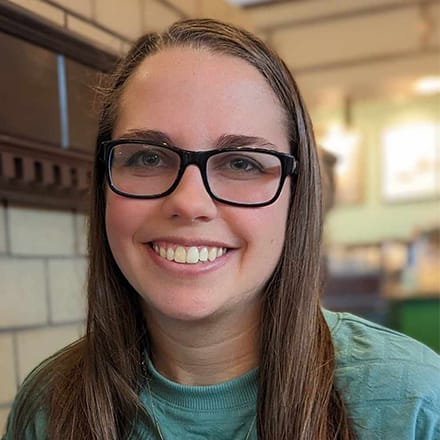39 SNHU Students Spent Spring Break Serving Others

For the last 15 years, Southern New Hampshire University (SNHU) students have spent their spring break completing service projects for communities across the U.S. and beyond. This year, SNHU's community and civic engagement office, The Chandler Center, sent 39 campus students and 8 faculty and staff members on an Alternative Break trip to 1 of 4 locations for a week of experiential learning.
According to Elizabeth Richards, the director of The Chandler Center, the 3 components of the Alternative Break program are:
- Education: Includes content provided in the pre-trip meetings led by the trip coordinators and learning opportunities throughout the trip
- Service: The organized projects students complete on the trip, related to the issues they studied
- Reflection: Allows students to share their experiences, thoughts and feelings each night of the trip
Each year, trip coordinators identify social issues affecting different communities and plan a week of service learning projects around them. Leading up to the trip, they educate their group on the selected issues and how their projects will impact the community.
This pre-trip component is critical to the program, according to Richards. It not only allows students to understand what to expect, but it also provides them with the knowledge to effectively engage with community members and make connections through their work.
A mission of the Chandler Center is to develop active citizens, and Richards believes the Alternative Break program does that. “Being in a place where you have to think about these issues from multiple lenses, I think just develops our empathy,” she said. “It develops our critical thinking skills, and it makes us more ready to go out into the world.”
Teaching English in the Dominican Republic
 While Alternative Break trip locations and service projects vary from year to year, SNHU students have been working with Outreach360 in Monte Cristi, Dominican Republic, for the last 5 years. Led by elementary education majors Izzy Proia and Nicole Clark, students combatted international education barriers by teaching English to children.
While Alternative Break trip locations and service projects vary from year to year, SNHU students have been working with Outreach360 in Monte Cristi, Dominican Republic, for the last 5 years. Led by elementary education majors Izzy Proia and Nicole Clark, students combatted international education barriers by teaching English to children.
During their pre-trip meetings, Proia and Clark led discussions about the poverty cycle and the differences between education in the U.S. and the Dominican Republic.
Once in Monte Cristi, students broke off into several groups and spent each day teaching in first- through eighth-grade classrooms. “I had never seen such an under-resourced school, yet all the students inside were so happy and so eager to learn,” Proia said.
Each evening, the groups reconvened to create lesson plans for the next day and learn about the Dominican culture through documentaries and music and dance lessons. They capped each night with their reflections from the day.
Proia’s most rewarding moment was reaching a disengaged child. After offering him some 1:1 attention and a little extra encouragement, she watched him connect to the lesson. Although language was a barrier at first, the students and children learned how to communicate with one another.
“The service is a two-way street,” Proia said. “We provide service to a community, and they provide us with opportunities to learn and grow.”
Combating Urban Homelessness in Washington D.C.
 Another group traveled to Washington D.C. to study urban homelessness for the second year in a row. Students assisted organizations that help find housing for those experiencing homelessness and volunteered in soup kitchens.
Another group traveled to Washington D.C. to study urban homelessness for the second year in a row. Students assisted organizations that help find housing for those experiencing homelessness and volunteered in soup kitchens.
Hannah Lewis, a creative writing degree student, was so impacted by the mission of this project when she participated last year that she decided to apply to be a trip coordinator this year. “I wanted to see what else I could do to work towards discovering the root causes to urban homelessness,” she said.
In this new role, she enjoyed watching her peers grow. "I feel honored to have been able to work with such wonderful people for the week."
The group focused on the systemic issues of poverty, leading causes of homelessness and how social service agencies work in D.C.
While volunteering, Lewis spoke with people experiencing homelessness and found the conversations humbling, offering her new perspectives on life.
Committing to National Park Preservation in Moab, Utah
Another group spent the week at Arches National Park in Moab, Utah, studying climate change and rehabilitating trails. They cleaned and performed maintenance on the trails, moved rocks, fixed steps and replaced fences. When they finished their work for the day, they had the opportunity to explore the park further.
 This trip was the third one Nejra Fazlic, a business administration degree student, went on, and one that most aligned with her passions and career goals. "I believe that our planet needs to be better taken care of," Fazlic said. "This trip focused on protecting the beauty of our natural environment... and the moment I learned about this trip, I knew I needed to go.”
This trip was the third one Nejra Fazlic, a business administration degree student, went on, and one that most aligned with her passions and career goals. "I believe that our planet needs to be better taken care of," Fazlic said. "This trip focused on protecting the beauty of our natural environment... and the moment I learned about this trip, I knew I needed to go.”
Graduating this year, she hopes to work in environmental sustainability.
Fazlic first came to the U.S. as a refugee when she was 3 years old, and that’s inspired her to give back to her communities. “That has really shaped me into who I am and made me really passionate to give back, especially when I have been given so many opportunities myself,” she said.
In addition to completing service projects and learning about different social issues, Fazlic met some of her closest friends through participating in Alternative Break.
Completing Immediate Disaster Relief in Pitt County, North Carolina
The Chandler Center originally planned to send a group to Pitt County, North Carolina, to aid those who were still recovering from Hurricane Matthew in 2016. After Hurricane Florence swept through the Carolinas in September, the trip’s focus shifted from long-term recovery to immediate disaster relief.
 The group studied what it’s like to live in an area that’s continuously affected by natural disaster and learned about the populations with limited abilities to relocate or rebuild. Upon arrival, students were split into two groups and spent the week rebuilding two different homes with severe water damage.
The group studied what it’s like to live in an area that’s continuously affected by natural disaster and learned about the populations with limited abilities to relocate or rebuild. Upon arrival, students were split into two groups and spent the week rebuilding two different homes with severe water damage.
Caylin Viets, an elementary education major, went as a trip coordinator. Her group put insulation in the house, laid down the floors and drywall and installed necessary appliances to make the house habitable again.
While working on the house, Viets learned that this wasn’t the first time the family was displaced. “Their house got finished a week before Florence hit… and then they had to start all over again. So he was legit back in his house for a week and then had to move again,” she said. “It’s just heartbreaking to hear some of the stories.”
While in Pitt County, the Alternative Break group also had an opportunity to meet three SNHU community members living in the area. To their surprise, a police officer in the town where they were repairing houses is also an SNHU online student. The next day, he stopped by the sites to see the group’s progress.
A Rewarding Opportunity
Students who participate in Alternative Break trip often apply to go again. “It will change your life,” Viets said. “Once you go on a trip, I feel like you want to go on every single one of them.”
They offer students a unique way to spend their spring break and experiential learning opportunities that may lead to new perspectives.
Viets likes the program because it challenges her to step outside of her comfort zone and learn more about the world. “You get to help people who might not be able to help themselves," Viets said. "You get to educate yourself on things you may not have known about the world around you."
Rebecca LeBoeuf ’18 is a staff writer at Southern New Hampshire University. Connect with her on LinkedIn.
Explore more content like this article

15 Years Later: A Surprise Reunion for Two Grads at Commencement

How Celebrating Small Wins Can Make a Big Difference

Heart, Hope and Some Help Along the Way: SNHU’s Fall Class of 2025
About Southern New Hampshire University

SNHU is a nonprofit, accredited university with a mission to make high-quality education more accessible and affordable for everyone.
Founded in 1932, and online since 1995, we’ve helped countless students reach their goals with flexible, career-focused programs. Our 300-acre campus in Manchester, NH is home to over 3,000 students, and we serve over 135,000 students online. Visit our about SNHU page to learn more about our mission, accreditations, leadership team, national recognitions and awards.


